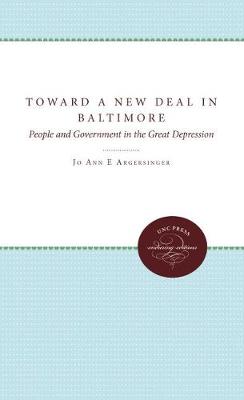Jo Ann Argersinger's innovative analysis of the New Deal years in Baltimore establishes the significance of citizen participation and community organization in shaping the welfare programs of the Great Depression. Baltimore, a border city divided by race and openly hostile to unions, the unemployed, and working women, is a particularly valuable locus for gauging the impact of the New Deal.
This book examines the interaction of federal, state, and local policies, and documents the partial efforts of the New Deal to reach out to new constituencies. By unraveling the complex connections between government intervention and citizen action, Argersinger offers new insights into the real meaning of the Roosevelt record. She demonstrates how New Deal programs both encouraged and restricted the organized efforts of groups traditionally ignored by major party politics. With federal assistance, Baltimore's blacks, women, unionizing workers, and homeless unemployed attempted to combat local conservatism and make the New Deal more responsive to their needs. Ultimately, citizen activism was as important as federal legislation in determining the contours of the New Deal in Baltimore.
A UNC Press Enduring Edition -- UNC Press Enduring Editions use the latest in digital technology to make available again books from our distinguished backlist that were previously out of print. These editions are published unaltered from the original, and are presented in affordable paperback formats, bringing readers both historical and cultural value.
- ISBN13 9780807857243
- Publish Date 27 January 2011 (first published 1 January 1988)
- Publish Status Active
- Out of Print 4 June 2021
- Publish Country US
- Imprint The University of North Carolina Press
- Edition New edition
- Format Paperback
- Pages 304
- Language English
